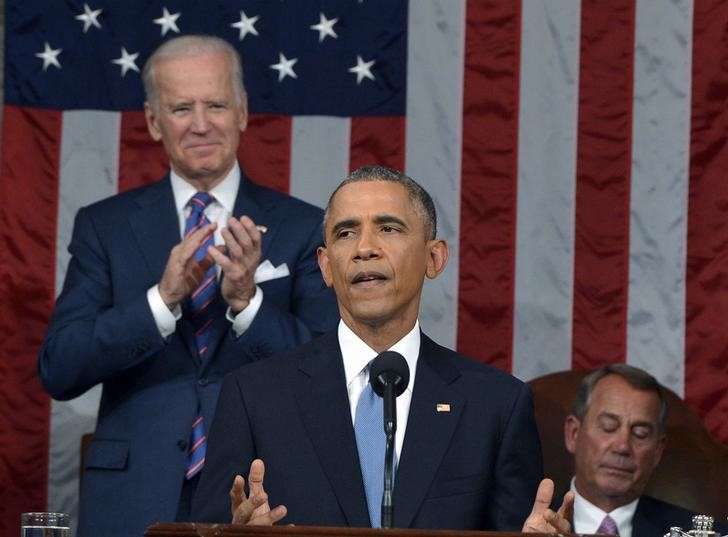By Andy Sullivan
WASHINGTON (Reuters) - President Barack Obama's vision of a stronger and more expensive safety net for middle class and poor Americans stands little chance of becoming law this year, but it could shape the debate for the 2016 election.
With his clout fast diminishing in Washington, and Republican and Democratic candidates gearing up for the White House race, Obama did his best in Tuesday's State of the Union address to set the agenda for potential successors wooing voters.
Even as he offered proposals such as higher taxes on the wealthy, which are likely to be rejected by the Republican-controlled Congress, Obama drew attention to income inequality that has persisted despite an improving economy.
Wage growth remains sluggish and the wealth gap between the most affluent and everybody else is the widest on record, according to the Pew Research Center. Most Americans still believe the economy is headed in the wrong direction, according to Reuters/IPSOS polling data.
Already, potential Republican candidates like Rand Paul and Mitt Romney have signaled that they will devote more attention to helping the less affluent.
While they are unlikely to sign off on a plan that raises taxes on the wealthy to expand government safety nets, as proposed by Obama, they will be under greater pressure to lay out their own proposals in detail.
Obama's speech will also have an impact on his own party.
Hillary Clinton, the likely frontrunner for the Democratic nomination, is already facing heat from Massachusetts Senator Elizabeth Warren and others on the left, who worry Clinton may bow to pressure from Wall Street and chip away at financial reforms enacted during Obama's tenure.
In a post on Twitter after the speech, Clinton wrote: "@BarackObama #SOTU pointed way to an economy that works for all. Now we need to step up & deliver for the middle class. #FairShot #FairShare"
When, as expected, Clinton starts to hit the campaign trail in earnest this spring, she will have to say whether she supports the specifics of Obama's plan to raise taxes on capital gains and other types of income that currently benefit the wealthiest - an uncomfortable topic for many of her deep-pocketed donors.
As a candidate who plans to make women's rights a central part of her message, Clinton would also have to say whether she backs Obama's plan to make child care more affordable through tax credits and expanded preschool education, or whether she agrees that all businesses should be required to provide paid sick leave.
SOME PLANS MAY BEAR FRUIT
Some of Obama's proposals could become reality before he leaves office. The sheer power of the presidency ensures that every visit to a community college or job-training site draws a rush of local media coverage that can pressure officials to act.
For example, Congress hasn't raised the minimum wage since Obama asked for that in his 2013 and 2014 speeches, but 20 states raised their own minimum wages at the beginning of this year.
Congress is not likely to back Obama's proposal to make community college free, which would cost $60 billion per year. But by highlighting places like Tennessee and Chicago that have set up their own free-tuition programs, he can pressure other states to consider the idea, or at least call upon them to restore higher-education subsidies that they slashed in the 2008-2009 recession.
Beyond the high-profile battles over healthcare and budgets, Obama has been able to chalk up wins on less glamorous initiatives that have been regular features of his past State of the Union addresses.
In December, Congress finally provided funding for a network of advanced-manufacturing research centers after the president highlighted a pilot program in his 2013 address.
This year, Republicans have signaled an interest in paying for more infrastructure improvements and bolstering cyber crime defenses, both of which Obama called for in his speech on Tuesday.
But Obama made clear he was not focused solely on short-term gains and wanted to ensure that his ideas remain influential after he leaves the White House.

"We have risen from recession freer to write our own future than any other nation on Earth," he said. "It's now up to us to choose who we want to be over the next 15 years, and for decades to come."